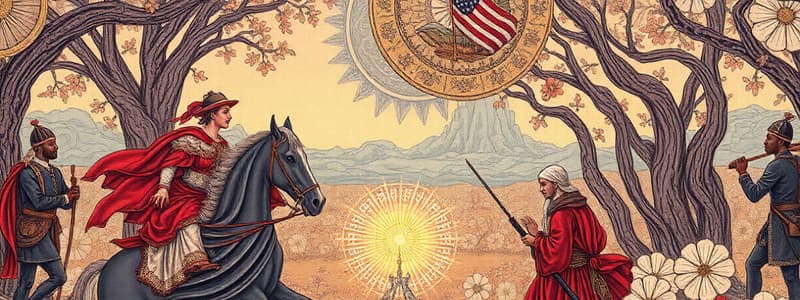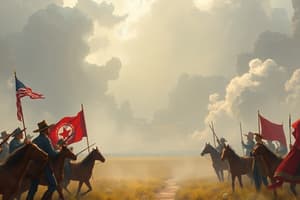Podcast
Questions and Answers
What was a major cause of the Mexican-American War?
What was a major cause of the Mexican-American War?
- Annexation of Texas (correct)
- The formation of the Republican Party
- The signing of the Treaty of Paris
- Support for Native American rights
The Kansas-Nebraska Act allowed people in those territories to decide on the issue of slavery.
The Kansas-Nebraska Act allowed people in those territories to decide on the issue of slavery.
True (A)
What was the primary goal of the Republican Party when it was formed in the 1850s?
What was the primary goal of the Republican Party when it was formed in the 1850s?
To prevent the spread of slavery into new territories.
The _____ Compromise attempted to maintain a balance between slave and free states.
The _____ Compromise attempted to maintain a balance between slave and free states.
Match the event to its description:
Match the event to its description:
Which state was made a free state as a result of the Compromise of 1850?
Which state was made a free state as a result of the Compromise of 1850?
Lincoln's victory in the 1860 election led to Southern states seceding from the Union.
Lincoln's victory in the 1860 election led to Southern states seceding from the Union.
What was the primary consequence of the Mexican-American War related to territory?
What was the primary consequence of the Mexican-American War related to territory?
Flashcards
Manifest Destiny
Manifest Destiny
The belief that the United States was destined to expand across the entire North American continent, including Mexican territory.
U.S. Gains Territory
U.S. Gains Territory
The U.S. added a large amount of territory from Mexico, including modern-day California, Arizona, New Mexico, and parts of Utah and Nevada, as a result of the war.
More Slavery Tension
More Slavery Tension
The disagreement between the North and South escalated over the issue of slavery, which was a major cause of the Civil War, after the war ended.
Missouri Compromise
Missouri Compromise
Signup and view all the flashcards
Compromise of 1850
Compromise of 1850
Signup and view all the flashcards
Kansas-Nebraska Act
Kansas-Nebraska Act
Signup and view all the flashcards
Dred Scott Decision
Dred Scott Decision
Signup and view all the flashcards
John Brown's Raid
John Brown's Raid
Signup and view all the flashcards
Study Notes
Mexican-American War Causes and Effects
- Annexation of Texas: Mexico opposed Texas joining the U.S., seeing it as still Mexican territory.
- Manifest Destiny: American belief in westward expansion, including land held by Mexico.
- Border Disputes: Disagreement over the Texas-Mexico border location.
- Slavery: Southern desire to expand slavery into new territories.
- U.S. Gains Territory: The U.S. acquired vast territories (California, Arizona, New Mexico, among others) following the war.
- Increased Slavery Tension: The debate over slavery in newly acquired territories widened the North-South divide.
- Native American Displacement: Native American populations were displaced as the U.S. expanded.
Key Events Leading to the Civil War
- Missouri Compromise (1820): Attempted to balance slave and free states by drawing a line; slavery permitted below, banned above.
- Compromise of 1850: Set of laws regarding slavery, including making California a free state and enacting a stricter fugitive slave law.
- Kansas-Nebraska Act (1854): Allowed residents of Kansas and Nebraska to decide on the issue of slavery, sparking violent conflict.
- Dred Scott Decision (1857): Supreme Court ruling denying citizenship to African Americans and forbidding the banning of slavery in territories.
- John Brown's Raid (1859): Abolitionist attempt to ignite a slave uprising at a federal arsenal; resulted in heightened Southern fears and tensions.
- Lincoln's Election (1860): Lincoln's anti-slavery stance and win of the presidential election motivated Southern states to secede and form the Confederacy.
Republican Party Formation and Lincoln's Election
- Republican Party Formation: Created in the 1850s to oppose the expansion of slavery; composed largely of former Whigs and others against the expansion of slavery.
- Lincoln's Rise to Prominence: Lincoln gained popularity through debates with Stephen Douglas, arguing against slavery's expansion.
- Lincoln's Presidential Candidacy (1860): Lincoln ran as the Republican candidate.
- Southern Secession: The Democratic party's division allowed Lincoln's victory, causing Southern states to secede out of fear of abolition, triggering the Civil War.
Studying That Suits You
Use AI to generate personalized quizzes and flashcards to suit your learning preferences.




